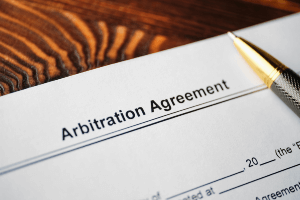 There are several ways a civil dispute may be resolved in Texas. You can not only file an insurance claim or lawsuit; you may also be able to use Alternative Dispute Resolution (ADR). One common type of ADR is arbitration.
There are several ways a civil dispute may be resolved in Texas. You can not only file an insurance claim or lawsuit; you may also be able to use Alternative Dispute Resolution (ADR). One common type of ADR is arbitration.
While no jury will be present during this process, it is still in your best interest to have an experienced Fort Worth personal injury attorney representing you and your interests.
What is Arbitration?
Arbitration is a private type of ADR in which both parties agree to resolve a civil matter by contracting an objective third party, called an arbitrator, to hear both sides of the argument and provide a resolution.
Voluntary vs. Mandatory Arbitration
Most arbitration is voluntary since you cannot be forced to agree to arbitration when making a third-party insurance claim. When both parties consent to this form of ADR, it is known as voluntary arbitration.
However, there are some instances when arbitration can be mandatory due to a clause in a contract or if it is ordered by a judge. Arbitration may be mandatory if you are filing a claim through your own insurance, called a first-party claim, if there is an arbitration clause. First-party claims include:
- Personal Injury Protection (PIP) claims
- Medical Payment claims
- Uninsured/Underinsured Motorist claims
Under Texas law, a written arbitration agreement is valid and enforceable if the controversy exists at the time of the agreement and/or the controversy arises between the two parties after the date of the agreement. The only time an arbitration clause may not be enforced is if there is a revocation of the contract for some legal reason.
Binding and Non-Binding Arbitration
When arbitration is binding, it means that the decision is final and may not be appealed through a lawsuit or other means. However, if the arbitration order is non-binding, the disputing parties have the option to accept the decision, file a lawsuit or propose another means of ADR as if the arbitration never happened.
Process of Arbitration
There are some similarities between arbitration and a jury trial, except there is no audience for arbitration. That said, the arbitration process is similar to the process of a jury trial.
Choosing the Arbitrator
The arbitrator is usually chosen to help resolve a dispute based on his or her merit and experience and is generally agreed upon by the conflicting parties. An arbitrator is usually someone with experience resolving legal disputes, such as a retired judge or lawyer.
Opening Statements
The next step is to provide both parties the opportunity to present an opening statement where the nature of the claim is laid out and each side presents their desired outcome.
Case Presentations
Each party presents their argument, backed up by evidence, to prove why the arbitrator should decide the case in their favor.
Closing Statements
Before the arbitrator decides on the claim, each party summarizes the strengths of their case and reiterates what they want for their side.
Decision
The decision from the arbitrator is typically issued on a different day than closing arguments, since there may be a lot of evidence for the arbitrator to comb through to come to a fair conclusion.
Pros and Cons of Arbitration
As in any legal proceeding, there are benefits and drawbacks. For example, there is a chance a jury would award more compensation than an arbitrator.
Some of the benefits of resolving an injury claim through arbitration include:
- Fewer expenses
- Quicker resolution
- Relaxed rules for evidence
- No testifying in open court
The drawbacks of arbitration compared to filing a lawsuit include:
- Your case is decided by a professional instead of a jury
- No opportunity to cross-examine witnesses or hear witness statements
- Discovery is limited
- Appealing the decision is difficult
Need Help with Your Texas Lawsuit? Call Us Today
Before you decide to resolve a personal injury dispute through arbitration, you should consider seeking legal representation. The attorneys at Anderson & Cummings are available to discuss your situation in a free consultation. We may be able to represent you during arbitration to advocate for your best interests.
Our attorneys have more than 50 years of combined experience dealing with large insurance companies looking to deny or devalue claims. We have a track record of success in recovering compensation from insurers looking to avoid accountability.
We offer a free consultation to discuss your claim with no obligation to hire us or take legal action. If you choose to let us represent you, we do not charge you anything while we work on your claim and only get paid if we recover compensation on your behalf.
Call us today at (817) 920-9000.
